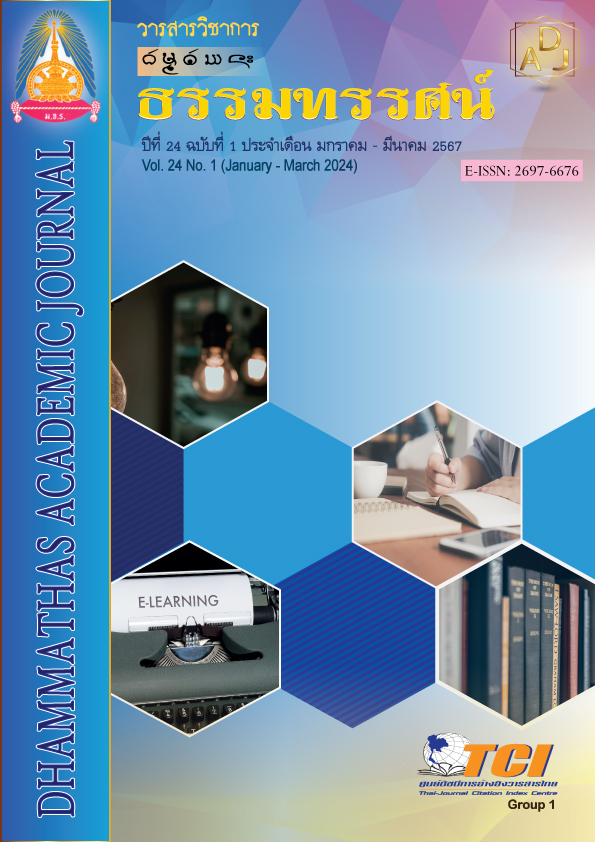The Creation of Life Skills in the Digital Era of People in Roi Et Province Based on Theravada Buddhists Philosophy
Main Article Content
Abstract
The purpose of this research is; 1) to study the problems of life skills in the digital era of people in Roi Et province, 2) to study the principles of Theravada Buddhist philosophy in order to create appropriate life skills, and 3) to analyze the creation of life skills in the digital era of people in Roi Et Province based on Theravada Buddhist philosophy. This is qualitative research, using in-depth interview of target population including Buddhist scholars, local administrators and organization leaders totaling 25 people, as well as monks and households. The results are presented using descriptive analysis methods.
The research result finds that: The target population experience difficulties with their living skills in four ways: 1) Lack of self-awareness, lack understanding the worth of life, both in terms of one’s roles and obligations towards oneself and others. Having the wrong understanding of those temptations. 2) Lack of emotional control many result in becoming mentally fragile, passionate, angry, rash, easily prone to love, and quick to love. 3) Lack of proper decision-making and problem-solving. 4) Lack of adjustment to live safely and peacefully with people in society. The target population have implemented Theravada Buddhist philosophy to create appropriate life skills. Sammaditthi is the right view has been proven to create effective self-awareness skill. Satisampajañña is a mindfulness practice capable of assisting in wisely managing emotions skill. Samadhi is a skill that concentrates and creates a focus for decision-making and problem-solving. And Pañña is a way to create wisdom and skills for social interaction in a way that is both normal and happy.
Article Details

This work is licensed under a Creative Commons Attribution-NonCommercial-NoDerivatives 4.0 International License.
เพื่อให้เป็นไปตามกฎหมายลิขสิทธิ์ ผู้นิพนธ์ทุกท่านต้องลงลายมือชื่อในแบบฟอร์มใบมอบลิขสิทธิ์บทความ ให้แก่วารสารฯ พร้อมกับบทความต้นฉบับที่ได้แก้ไขครั้งสุดท้าย นอกจากนี้ ผู้นิพนธ์ทุกท่านต้องยืนยันว่าบทความ ต้นฉบับที่ส่งมาตีพิมพ์นั้น ได้ส่งมาตีพิมพ์เฉพาะในวารสาร วิชาการธรรม ทรรศน์ เพียงแห่งเดียวเท่านั้น หากมีการใช้ ภาพหรือตารางของผู้นิพนธ์อื่นที่ปรากฏในสิ่งตีพิมพ์อื่นมาแล้ว ผู้นิพนธ์ต้องขออนุญาตเจ้าของลิขสิทธิ์ก่อน พร้อมทั้ง แสดงหนังสือที่ได้รับการยินยอมต่อบรรณาธิการ ก่อนที่บทความจะได้รับการตีพิมพ์References
กาญจนา หาญศรีวรพงศ์. (2561). การสร้างดุลยภาพชีวิตตามหลักธรรมในพระพุทธศาสนา. (วิทยานิพนธ์พุทธศาสตรดุษฎีบัณฑิต). พระนครศรีอยุธยา: มหาวิทยาลัยมหาจุฬาลงกรณราชวิทยาลัย.
ข่าวออนไลน์ 7HD. (2566). เจ้าหน้าที่ฆ่าตัวตายเมืองร้อยเอ็ด. เข้าถึงได้จาก https://www.news.ch7.com
เดลินิวส์ออนไลน์. (2566). เดนคุกก่อคดีฆ่าพ่อ ข่มขืนแม่ ฟันเพื่อน. เข้าถึงได้จาก https://www.dailynews.co.th
ทิพย์ภวิษณ์ ใสชาติ. (2557). วิเคราะห์ค่านิยมบริโภคตามแนวพระพุทธศาสนา. (สารนิพนธ์พุทธศาสตรดุษฎีบัณฑิต). พระนครศรีอยุธยา: มหาวิทยาลัยมหาจุฬาลงกรณราชวิทยาลัย.
ไทยรัฐออนไลน์. (2566). พ่อเลี้ยงอำมหิตฆ่าเด็ก 12 โบกปูนยัดใส่ถังน้ำแข็ง. เข้าถึงได้จาก https://www.thairath.co.th
ธรรมรักษ์. (2559). พรวิเศษของพ่อ พระราชดำรัสพระบาทสมเด็จพระเจ้าอยู่หัว รัชการที่ 9. กรุงเทพฯ: เสบียงบุญ.
พระธรรมปิฎก (ป.อ.ปยุตฺโต). (2546). พุทธธรรมฉบับขยายความ. (พิมพ์ครั้งที่ 10). กรุงเทพฯ: สหธัมมิก.
พระพุทธโฆษาจารย์ (ป.อ.ปยุตฺโต). (2562). สุขภาวะองค์รวมแนวพุทธ. (พิมพ์ครั้งที่ 34). กรุงเทพฯ: สหธัมมิก.
มหาวิทยาลัยมหาจุฬาลงกรณราชวิทยาลัย. (2539). พระไตรปิฎกภาษาไทย ฉบับมหาจุฬาลงกรณราชวิทยาลัย. กรุงเทพฯ: มหาจุฬาลงกรณราชวิทยาลัย.
สนามข่าว 7 สี ออนไลน์. (2566). บุกบ้านยาย 78 ฆ่าชิงทรัพย์ ร้อยเอ็ด. เข้าถึงได้จาก https://www.news.ch7.com
สิทธิ์ บุตรอินทร์. (2559). ปรัชญานิพนธ์. กรุงเทพฯ: ศยาม.
สำนักข่าวไทย. (2566). สารวัตรกำนันถูกแก๊งมิจฉาชีพหลอกกดลิงค์ ร้อยเอ็ด. เข้าถึงได้จาก https//:www.tna.mcot.net
สำนักงานราชบัณฑิตยสภา. (2566). รู้จักภาษาไทย. เข้าถึงได้จาก https//:www.orst.go.th
โสวิทย์ บำรุงภักดิ์. (2560). การศึกษาวิเคราะห์พุทธจริยศาสตร์ในวรรณกรรมสินไซ. (รายงานการวิจัย). ขอนแก่น: มหาวิทยาลัยมหาจุฬาลงกรณราชวิทยาลัย วิทยาเขตขอนแก่น.

